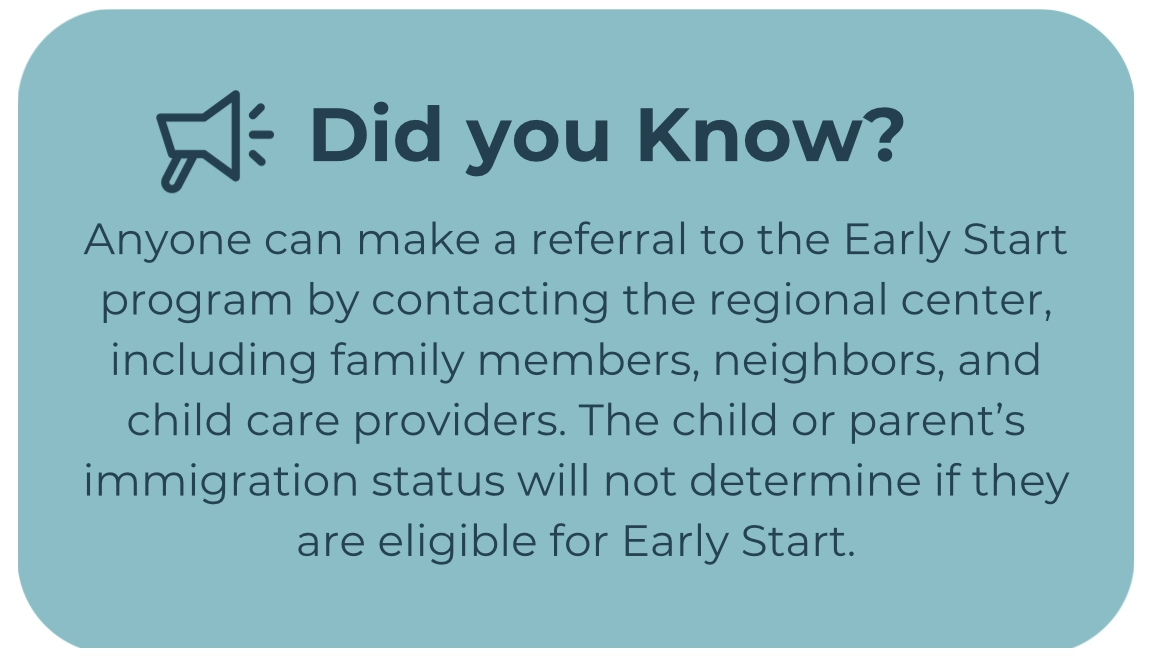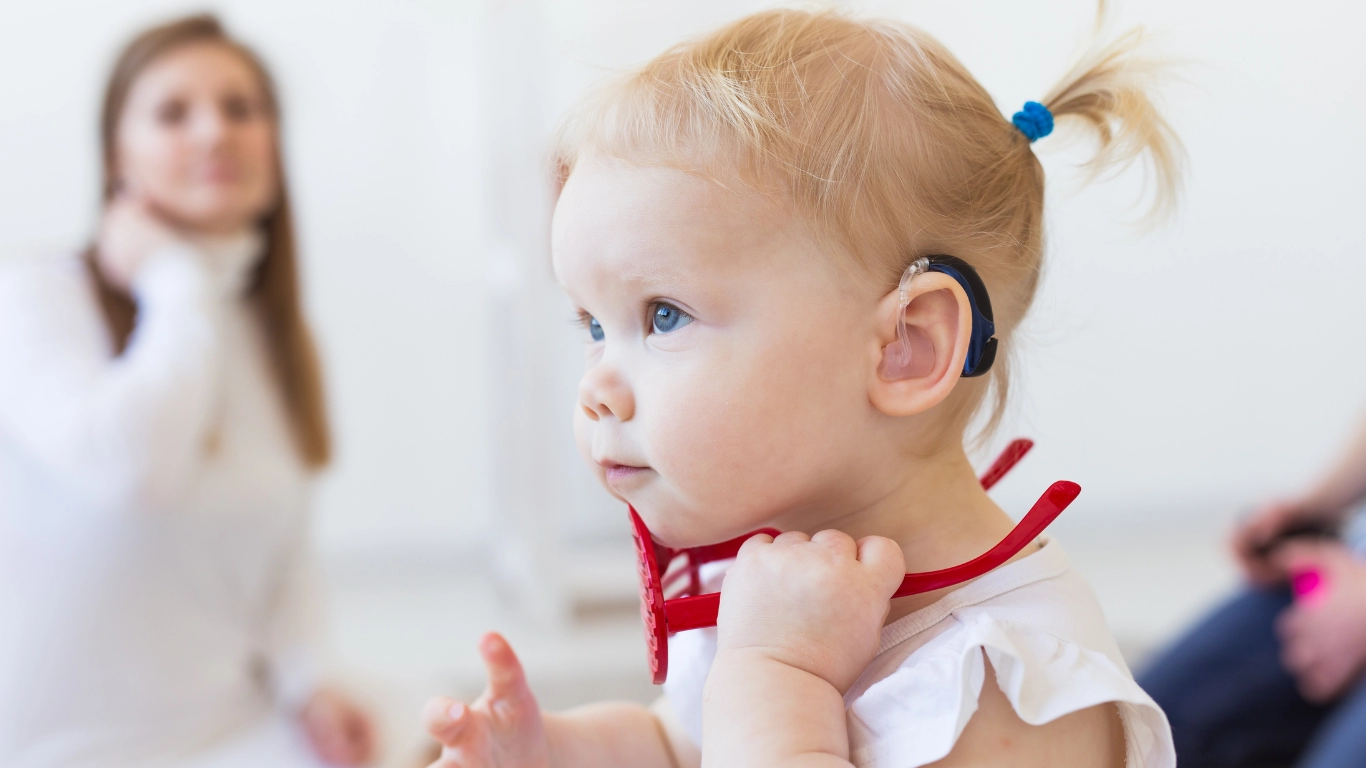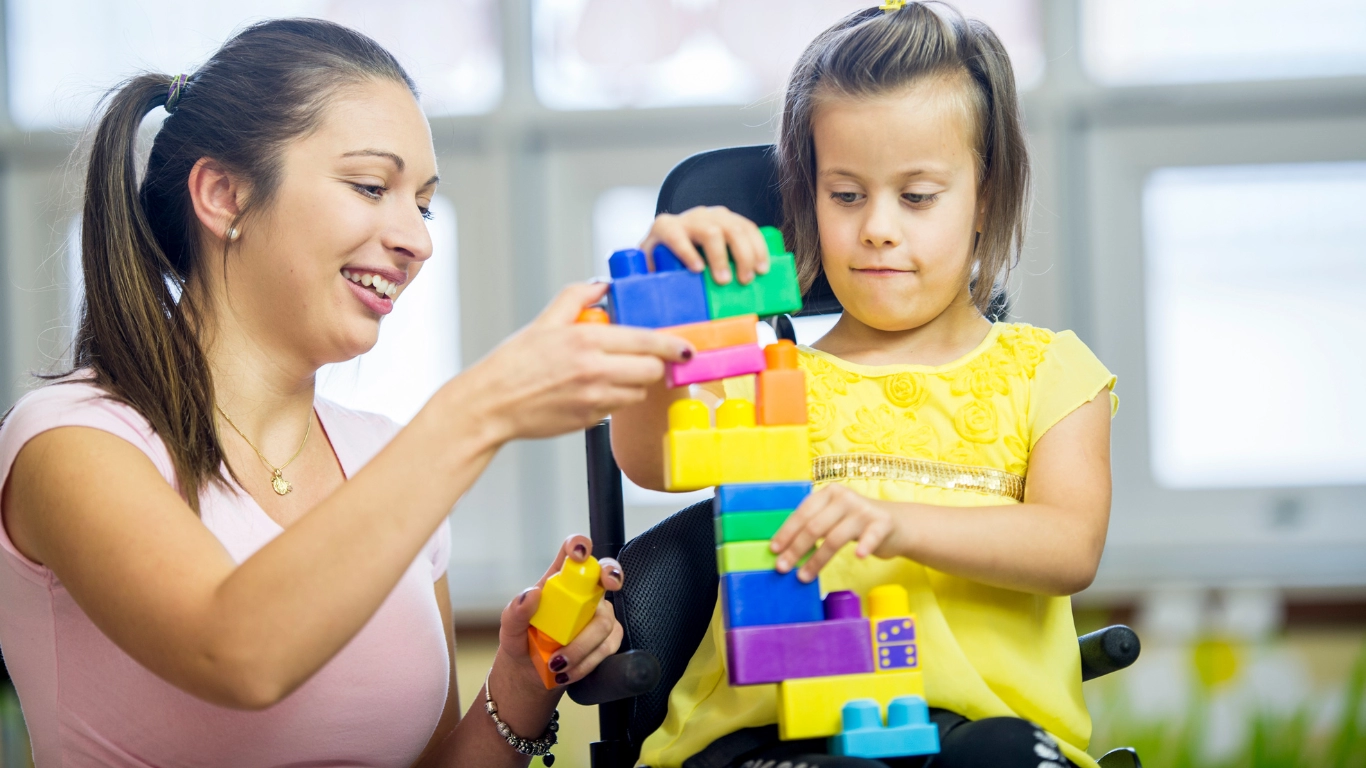
Overview
All children have a right to high-quality early care and education. Inclusive child care programs support children with disabilities and delays and connect families to community resources. Learn how you can support every child in your care by building inclusivity into your program.

Children with disabilities and delays may have different needs when it comes to child care. Early identification and intervention can equip children and families with support for emerging developmental needs and improve long-term outcomes. In California, the Department of Developmental Services provides early intervention services through Early Start, a program for infants and toddlers with developmental delays or who are at risk of developmental disabilities. Children up to 36 months of age can access free special services through Early Start. To get families started, have them contact their local regional center (see Family Engagement and Resources below) to get connected to programs and receive an individualized family service plan (IFSP) that will provide details on services and how they will be provided.
A child who is 3 years of age and older will receive special services and an Individualized Education Plan (IEP) through their school district. For children up to age 5 who live within the boundaries of LA Unified School District (LAUSD), these special services are provided through Early Childhood Special Education (ECSE). Referrals to ECSE may be made by parents, physicians or community agencies with parental consent, or a regional center service coordinator if the child is already receiving services through Early Start. ECSE also offers supports for children from birth. Children receiving services through ECSE can still use child care from outside LAUSD. For more information, find ECSE on the ECSE website, by calling (213) 241-4713 from Monday to Friday, 7:30am-5pm, or by emailing ECSE@lausd.net.
Educator Resources

How can I help identify developmental delays and disabilities?
As a child care provider, you can be an advocate for the children in your care by flagging developmental concerns for families and helping them find support through developmental monitoring and screening.
- Developmental monitoring
Developmental monitoring is the observing of a child’s growth to see if they are meeting the developmental milestones appropriate to their age. Parents, child care providers, and other caregivers can all take part in developmental monitoring.
- Developmental screening
Developmental screening is conducted through a formal developmental screening tool, like a test or a questionnaire. It can be done by a healthcare professional, like a doctor, or other professionals including trained child care providers.
Learn about implementing developmental screening in your child care program by visiting the Help Me Grow National Center’s website and reading their Birth to Five: Watch Me Thrive guide for ECE professionals.
Developmental screening is often administered when the family or doctor has a concern; however, it is also a regular part of monitoring all children’s healthy development. If developmental screening flags a concern, a formal developmental evaluation may be done by a trained specialist like a developmental pediatrician to assess the child’s status and needs.
The CDC hosts a website that helps families track key milestones in their child’s development and learn about developmental screening. The website also features resources for child care providers to learn more about their role in early intervention, including a free, 1-hour online course called “Watch Me! Celebrating Milestones and Sharing Concerns.”


How Can I Make My Program Inclusive for All Children?
Almost all child care programs, including family child care homes, are required by the Americans with Disabilities Act (ADA) to give children and parents with disabilities an equal opportunity to use their services. This responsibility includes making case-by-case assessments about your program’s ability to accommodate the specific needs of a child with a disability and making reasonable accommodations. The Child Care Law Center, which provides information on legal topics for California’s child care providers, has a Kids with Disabilities page all about child care providers’ responsibilities under the Americans with Disabilities Act and related topics. Providers can also visit the ADA.gov website to learn about their responsibilities under the ADA and review commonly asked questions.
Visit the resources below to learn more about how to support all children in your care.
- California MAP to Inclusion & Belonging
The California MAP to Inclusion & Belonging works to support access to inclusive child care for both families and providers. Their website offers resources including on Infant & Early Childhood Mental Health, Early Identification, and Training & Technical Assistance.
- Inclusive Early Education Resources
The California Department of Education offers a list of resources for providers, administrators, and families that support access to inclusive child care.
- Head Start Early Childhood Learning & Knowledge Center
Head Start ECLKC offers guides, videos, webinars, and other resources for child care providers supporting children with disabilities.
- Infant and Early Childhood Mental Health Consultation Network
The IECMHC Network provides free consultation services and supports for Californian ECE providers in center, family child care home, and FFN settings. Their resources are geared toward supporting the developmental, social, and emotional health of children in ECE programs.

Family Engagement and Resources
Child care providers are crucial partners in helping families identify early signs of delays and disabilities and can guide families to critical services. If families ask you about supportive services, consider sending them to CIFD’s resource page, Early Intervention for Families. You can also learn about select resources below.

Where to Start
In the City of Los Angeles, the Department on Disability is available to refer individuals and their families and caregivers to supportive services and agencies, like regional centers. In addition, the following agencies are common starting points for families of children with disabilities (or families seeking evaluation for their children) to find support and services.
- Regional Centers
Regional centers are publicly funded, community-based organizations that connect Californians with developmental disabilities to services and supports including care. Help a family locate their local regional center on the Department of Developmental Services’ regional center lookup tool or by calling 1-800-515-BABY to get the phone number of a local regional center.
- Family Resource Centers
Family Resource Centers work together with regional centers and education agencies to connect children with disabilities and special needs to early intervention services. Their multilingual services include information and referral, help navigating the Early Start system, and parent-to-parent support. Help families find their local Family Resource Center on the Family Resource Centers Network of California website. You can also direct them to call 1-800-515-BABY to get the phone number of a local Family Resource Center.
- Family Empowerment Centers
Family Empowerment Centers are nonprofit organizations that provide training, peer support, referral services, and information to families of children and young adults with disabilities. Family Empowerment Centers also support families through the IEP process. Help a family find their local FEC by using the Seeds of Partnership directory or by calling (916) 228-2388 for assistance.
- Help Me Grow LA
Help Me Grow LA is here to connect LA County families to developmental services and supports. Direct families to visit their website to access information on developmental milestones, developmental screenings, and finding supportive programs.

Financial Supports
Special financial supports are available for families of children with disabilities. Share the below highlighted financial supports with the families you serve, or direct them to CIFD’s Early Intervention for Families page for more.
- Supplemental Security Income (SSI) for Children
Supplemental Security Income provides qualifying families with monthly cash payments for children up to the age of 18 with disabilities. (Infographic)
- Medicaid (Medi-Cal)
Medicaid is a federal and state program that provides health coverage for populations including low-income adults, children, and people with disabilities. In California, Medicaid is called Medi-Cal. Individuals who do not qualify for Medi-Cal may qualify for a Medi-Cal Waiver, which provides assistance for services and resources including medical treatment, medical equipment, and respite care.
- Children’s Health Insurance Program (CHIP)
Children’s Health Insurance Program provides health coverage for uninsured children up to age 19 from working families who make too much money to qualify for Medi-Cal. CHIP provides insurance for prescription drugs and vision, hearing, and mental health coverage.
- CalABLE
CalABLE allows people to save up to $100,000 for disability-related expenses without losing their eligibility for public benefits programs like SSI and Medi-Cal. This program is open to individuals with disabilities that occurred before age 26 who meet program criteria.
Key Terms
- Developmental delay
Occurs when a child is slow to achieve, or does not achieve, developmental milestones for their age group. Developmental delays are common and occur in as many as 1 in 6 children. Early Start, California’s early intervention program, can help a child catch up.
- Developmental disability
In California, a condition that occurs before the age of 18 years that is a substantial impairment in three or more areas of major life activity, and includes intellectual disability, autism, epilepsy, cerebral palsy, and conditions that require services similar to those required for intellectual disability. Early Start, California’s early intervention program, can help young children with developmental disabilities learn skills that usually form during a child’s early years.
- Disability
A condition, including physical or mental disabilities and medical conditions such as cancer and HIV/AIDS, that limits one or more major life activities.
- Early intervention
Supports for young children with developmental delays and disabilities and the families of these children.
- Inclusive care
Group care settings that actively include children with disabilities or delays with accommodations and supports.
- Individualized Education Plan (IEP)
A written plan for children ages 3 years and older outlining the educational plan for a child with delays or disabilities.
- Individualized family service plan (IFSP)
A family-focused written plan for providing early intervention services to infants and toddlers (birth to 36 months). It is developed by a service coordinator and the family, and includes the child’s current level of functioning and need as well as details about the services to be provided.




